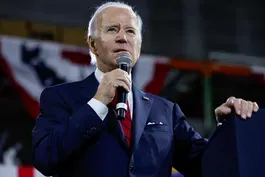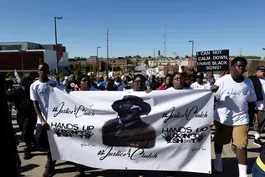
Jake Blount's new twist on Black American folk music
Clip: 1/31/2023 | 6m 36sVideo has Closed Captions
Jake Blount's new twist on Black American folk music
When folklorists went to the American South last century to record and preserve traditional string band music, they probably didn’t imagine that someday a 27-year-old like Jake Blount would come along to not only update the tradition but to help ensure its future. Special correspondent Tom Casciato has the story for our arts and culture series, CANVAS.
Problems with Closed Captions? Closed Captioning Feedback
Problems with Closed Captions? Closed Captioning Feedback
Major corporate funding for the PBS News Hour is provided by BDO, BNSF, Consumer Cellular, American Cruise Lines, and Raymond James. Funding for the PBS NewsHour Weekend is provided by...

Jake Blount's new twist on Black American folk music
Clip: 1/31/2023 | 6m 36sVideo has Closed Captions
When folklorists went to the American South last century to record and preserve traditional string band music, they probably didn’t imagine that someday a 27-year-old like Jake Blount would come along to not only update the tradition but to help ensure its future. Special correspondent Tom Casciato has the story for our arts and culture series, CANVAS.
Problems with Closed Captions? Closed Captioning Feedback
How to Watch PBS News Hour
PBS News Hour is available to stream on pbs.org and the free PBS App, available on iPhone, Apple TV, Android TV, Android smartphones, Amazon Fire TV, Amazon Fire Tablet, Roku, Samsung Smart TV, and Vizio.
Providing Support for PBS.org
Learn Moreabout PBS online sponsorshipAMNA NAWAZ: When folklorists went to the American South last century to record and preserve traditional string band music, they probably didn't imagine that someday a 27-year-old like Jake Blount would come along to not only update the tradition, but to help ensure its future too.
Blount is gaining recognition for his work and is up for artist of the year at the International Folk Music Awards being held tomorrow night.
Special correspondent Tom Casciato met up with him for our arts and culture series, Canvas.
TOM CASCIATO: Jake Blount is a musician on a mission.
Upon first listen on this night at Brooklyn's Jalopy Theatre, you might think it was simply to keep up the tradition of what's known as old-time or string band music.
JAKE BLOUNT, Musician: I try to cultivate a really close relationship with the body of source recordings that we have that comes from these bygone musicians who are a generation or two or three ahead of me.
TOM CASCIATO: He's studied those sources, extraordinary artists born over a century ago like Bessie Jones, Vera Hall, and Lead Belly.
But Jake Blount isn't content to simply research and copy the past.
In fact, he's pulled the sound right into the present and put his own spin on it.
JAKE BLOUNT: String band music, whether it's spirituals, whatever, is still alive and breathing and growing.
It is not restricted to old times.
I think its perfectly allowable to admit that people who are young and alive today have things to contribute to that.
TOM CASCIATO: He proved that point on his first full-length release, 2020's "Spider Tales, where he covered Lead Belly's classic tale of jealousy and suspicion, "Where Did You Sleep Last Night."
Blount's version changes the girl to a boy, giving the song what The Guardian called an arresting new power on an album it deemed an instant classic.
JAKE BLOUNT: My boy, my boy, don't lie to me.
TOM CASCIATO: His most recent album is called "The New Faith."
It contains a song called "The Downward Road."
This 1934 version is sung by a group of incarcerated Black men in South Carolina.
It's a spiritual about the damnation awaiting unbelieving souls.
But Jake Blount has repurposed it.
The road still heads downward, and it's still crowded with imperiled souls, perhaps for eternity.
But the doom that awaits is a new kind of help, environmental catastrophe.
JAKE BLOUNT: Hello, Brooklyn.
(CHEERING AND APPLAUSE) JAKE BLOUNT: If you're anxious about climate change, say woo!
(CHEERING) JAKE BLOUNT: When we started this trip, a third of Pakistan was underwater and 50 million people were out of their homes.
And we started this tour off to the joyous news that apparently mankind has wiped out an average of 70 percent of animal populations over the past 50 years.
TOM CASCIATO: One really feels listening to "The New Faith" the precariousness that your generation must feel about the future.
JAKE BLOUNT: I am terrified.
And everyone I know is terrified.
I don't know what were supposed to do.
I'm going to be old and infirm, and the world's going to be collapsing around me.
I felt like I needed to approach it somehow.
TOM CASCIATO: His approach is to put a futuristic spin on the songs of his Black musical ancestors.
"The New Faith" imagines how Black refugees would be forced to recreate their lost music from memory once the world is ravaged by climate change.
JAKE BLOUNT: Designing the sounds, designing the concept meant thinking about people who've heard all of the music that we have heard up until today, inclusive of rap, of disco, of all of these different genres that have come out of the Black community, and then had to make those things again because they don't have access to our technology.
TOM CASCIATO: "Didn't It Rain" is a spiritual about Noah's flood.
It was once sung by pioneering electric guitarist Sister Rosetta Tharpe in early rock 'n' roll fashion.
For the coming deluge, Blount takes a swinging approach, but the electric guitar becomes ominous.
And he not only reworks records of the past; he imagines records that were never even made.
He says, when field recording went from collecting folklore to making commercial releases, many Black musicians were erased, or nearly so.
JAKE BLOUNT: Industry folks went down to the south and started recording people.
They made two kinds of records.
They made hillbilly records, which were string band music, and they made race records, which was whatever Black people did.
And they wanted that to be blues, jazz, eventually gospel.
And you have Black musicians like Cuje Bertram, who was a Black banjo and fiddle player.
Cuje never got recorded until he was like a 70-something-year-old man.
And there are a set of recordings that a folklorist made in his living room with his grandchildren running around banging on things and yelling.
I do love it.
But the end result is that people were written out of the sound.
What I'm doing is reimagining a version of string band music where Black people were not erased.
TOM CASCIATO: And where Jake Blount is not afraid to mix old-time fiddle with hip-hop verses from his friend the rapper known as Demeanor about sea levels reaching new heights.
You might say that's the sound of the future of tradition.
For the "PBS NewsHour," I'm Tom Casciato in Brooklyn, New York.
Biden's economic adviser on inflation, possible recession
Video has Closed Captions
Clip: 1/31/2023 | 8m 16s | Biden's top economic adviser on inflation, interest rates and possible recession (8m 16s)
Family of man killed by officer discusses police reform
Video has Closed Captions
Clip: 1/31/2023 | 7m 5s | Family of man killed by officer in 2016 describes efforts to reform policing (7m 5s)
House Republicans prepare to start Biden investigations
Video has Closed Captions
Clip: 1/31/2023 | 5m 13s | House Republicans prepare to kick off investigations into Biden White House (5m 13s)
N.C. Republican explains why he supports Medicaid expansion
Video has Closed Captions
Clip: 1/31/2023 | 5m 2s | N.C. Republican explains why he now supports Medicaid expansion after years of opposing it (5m 2s)
Police tactics under scrutiny in wake of Tyre Nichols death
Video has Closed Captions
Clip: 1/31/2023 | 6m 1s | Police tactics again under scrutiny in wake of killing of Tyre Nichols (6m 1s)
What happens when U.S. COVID emergency measures end in May?
Video has Closed Captions
Clip: 1/31/2023 | 6m 29s | What happens when U.S. COVID emergency measures end in May? (6m 29s)
Providing Support for PBS.org
Learn Moreabout PBS online sponsorshipSupport for PBS provided by:
Major corporate funding for the PBS News Hour is provided by BDO, BNSF, Consumer Cellular, American Cruise Lines, and Raymond James. Funding for the PBS NewsHour Weekend is provided by...
















